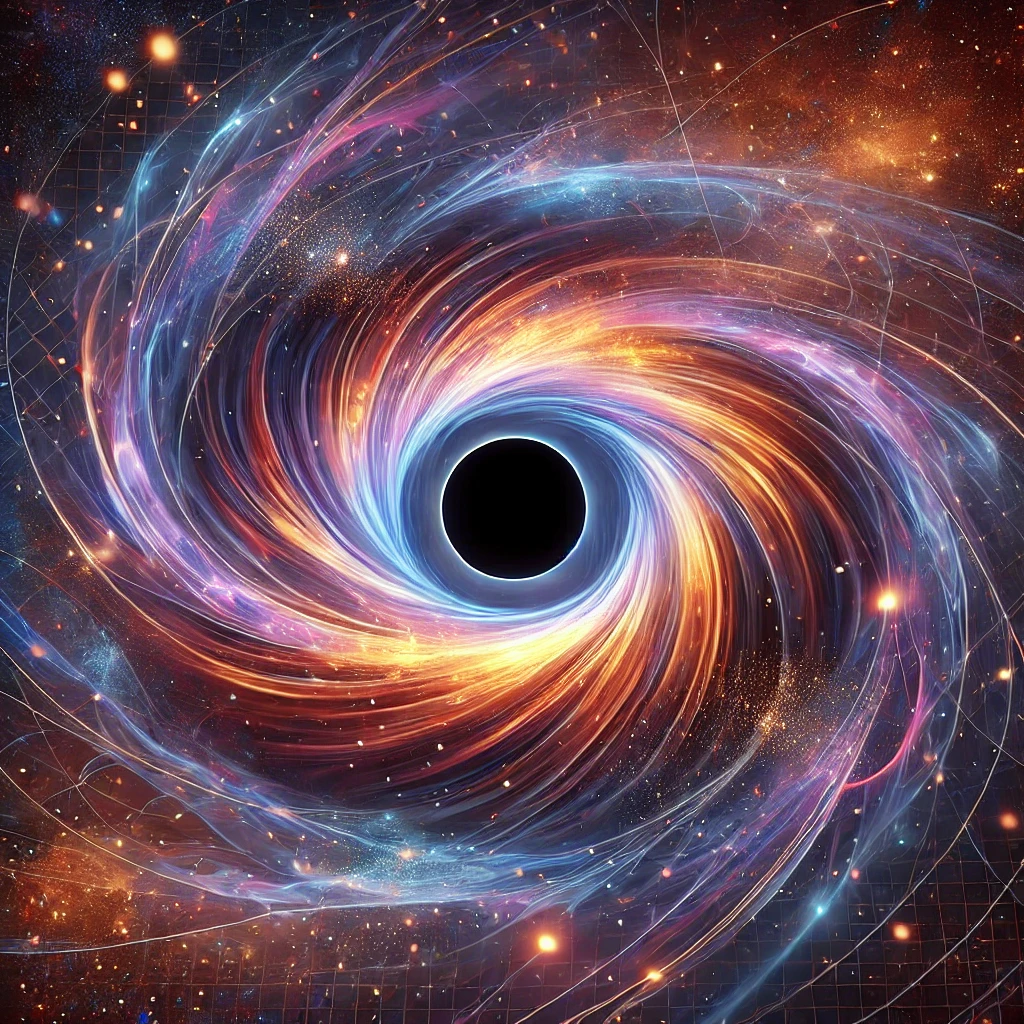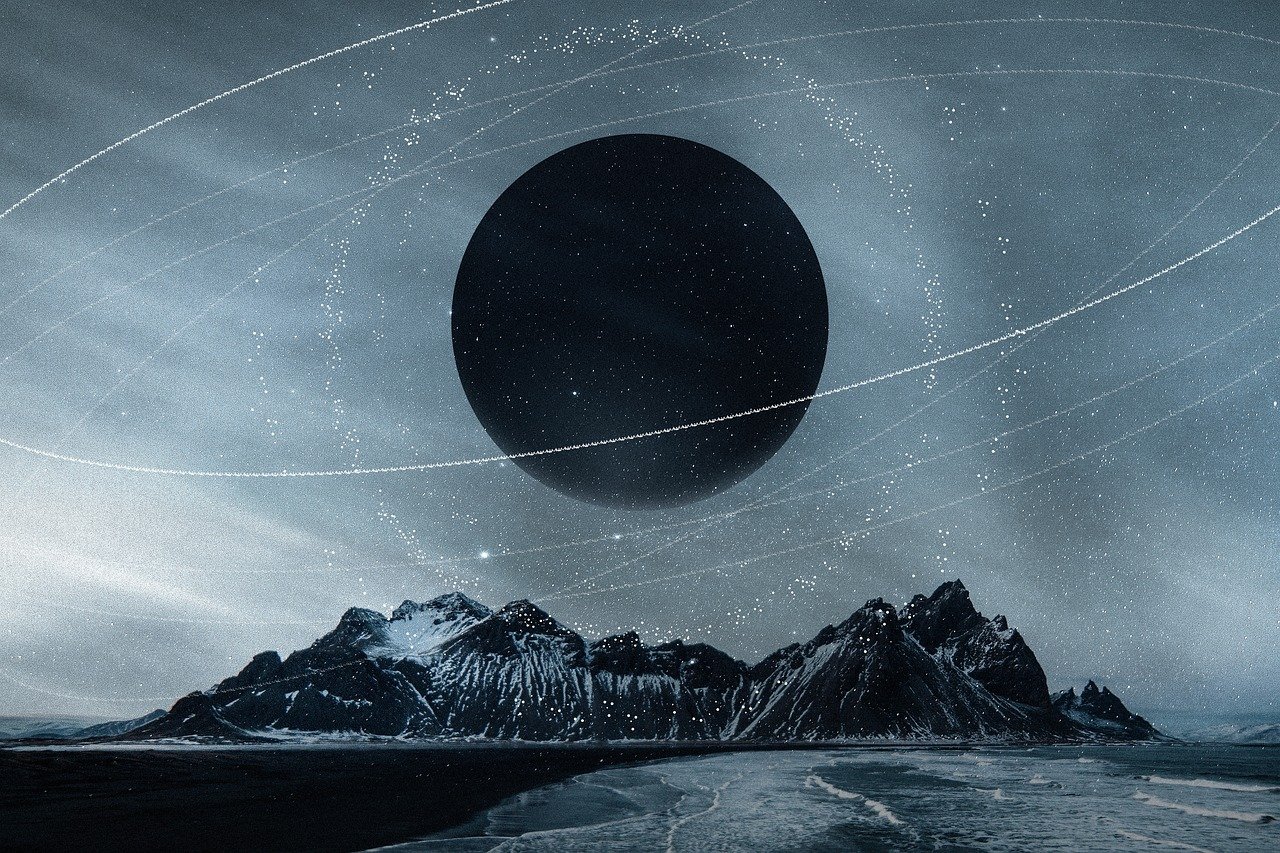As Jana Levin and Neil deGrasse Tyson discuss in their exploration of black holes, spaghettification occurs when an object crosses the event horizon of a black hole, destined to reach the singularity. Once the event horizon is crossed, the outcome is inevitable—it’s just a matter of time. This scientific concept resonates far beyond astrophysics, offering a profound metaphor for the nature of life, death, and the universe itself.
Inevitability is universal. From the moment we are born, we are pulled toward an endpoint. Stars burn through their fuel, eventually collapsing into white dwarfs, neutron stars, or black holes. Civilizations rise and fall. Even the universe itself will one day succumb to entropy in the so-called “heat death.” Crossing the event horizon of a black hole is like reaching a point in time where the trajectory becomes irreversible, whether for a star collapsing or for a human life reaching its twilight. This inevitability doesn’t rob existence of meaning; rather, it illuminates the delicate balance of creation and destruction that defines the cosmos.
Let’s take a cosmic perspective on mortality. The singularity of a black hole is the ultimate destination for any matter crossing the event horizon, much like death is the ultimate endpoint for living beings. This parallel encourages us to reflect: could our lives be seen as a kind of spaghettification? Stretched and shaped by the forces of time, relationships, and experience, we are transformed along the journey toward our inevitable end. Yet, just as matter doesn’t vanish but transforms, perhaps our essence, our contributions, ripple outward into the universe, continuing to exist in some form.
There is hope and beauty in the process. Consider the light emitted by a star before it winks out of existence, or the gravitational waves from black holes colliding. These are profound expressions of energy and transformation, creating beauty in the process of decay. Similarly, our lives, though finite, can create ripples of meaning—through love, creativity, and discovery—that outlast our physical selves. The inevitability of spaghettification is not just a tale of doom but a story of transformation and the enduring power of presence, even in the face of the singularity.
Humanity is a Witness to the Universe. In the grand scheme of cosmic inevitability, humanity occupies a unique role. We are the universe’s witnesses, observing, questioning, and understanding its mysteries. This consciousness allows us to marvel at the processes that will one day consume even the stars. As we reflect on the spaghettification of black holes, we can also reflect on our own journey as participants in the grand cosmic dance. Our ability to comprehend the beauty and complexity of the universe gives meaning to an otherwise indifferent cosmos. In some sense, we are the universe contemplating itself, a flicker of awareness in an immense void.
Embracing the light before the horizon; If spaghettification is a metaphor for life, then the lesson it offers is clear: embrace the moments before the event horizon, because they define the journey. As we approach our own inevitabilities, we can choose to live fully, create ripples of positivity, and marvel at the incredible fact that we are here to witness it all.
The universe is full of mysteries, but few are as provocative as the black hole information paradox. This cosmic conundrum challenges our understanding of how information, energy, and matter behave in the face of black holes. It raises profound questions not just about the nature of the universe but about the meaning of life, death, and the possibility of renewal.
In this exploration, we’ll approach the paradox from two perspectives. The first will delve into the spiritual and philosophical implications of losing information, considering what it means for our place in the universe. The second will explore the scientific theories and debates surrounding black holes and the preservation of information.
The Black Hole Information Paradox: Science, Faith, and the Meaning of Endings
The spiritual and philosophical perspective hinges upon a crisis of faith. For centuries, many cultures and philosophies have embraced the idea of an endless cycle of life, death, and renewal. Whether it’s reincarnation, the conservation of energy in physics, or the spiritual notion of a soul’s eternal journey, this belief has provided comfort and meaning. The black hole information paradox, however, introduces a chilling possibility: what if there is no cycle? What if information, once lost, can never return?
The event horizon of existence; crossing the event horizon of a black hole is akin to crossing the boundary of mortality. It’s a one-way journey, where matter and energy are drawn toward an inevitable end—the singularity. Philosophically, this mirrors the human experience of death. While many believe in some form of continuation, the paradox suggests there might be a place where all essence is truly erased.
It’s the fear of true finality, I think – If information can vanish in a black hole, it implies a universe where endings are absolute. This contradicts the deeply ingrained human hope for transformation and renewal. It suggests that some things—particles, memories, lives—might cease to exist entirely, leaving no trace. For many, this is a crisis of faith, challenging the idea that nothing is ever truly lost.
There is beauty in the cycle, despite this unsettling possibility, the universe still demonstrates cycles of creation and destruction. Stars are born, live, and die, scattering their elements into space to form new stars, planets, and even life. This cycle inspires hope that even if black holes seem to defy it, there might be mechanisms we don’t yet understand that preserve the continuity of existence.
What is the role of hope in mystery? Faith—whether in religion, science, or humanity’s ability to understand the cosmos—often thrives in the face of the unknown. The paradox doesn’t have to negate our beliefs; instead, it can deepen our appreciation for the mysteries of existence. After all, even if we don’t yet know how information is preserved, the very act of seeking answers is a testament to our resilience.
There is a spirituality of science in all of this; science and spirituality often seem at odds, but in this paradox, they converge. The search for a resolution mirrors humanity’s eternal quest for meaning. Whether we view the universe as a divine creation or a natural marvel, the black hole information paradox invites us to contemplate our role in the cosmic dance. Ultimately, the paradox challenges us to consider what it means to truly live. If information can be lost, does that make our time here more precious? Perhaps the lesson isn’t about whether life ends, but about what we create and share before crossing our own event horizons.
The Scientific Perspective is the Nature of the Paradox
The black hole information paradox arises from a conflict between quantum mechanics and general relativity. Quantum mechanics insists that information is conserved, while general relativity suggests that information falling into a black hole could be lost forever. This clash between the two pillars of modern physics makes the paradox one of the greatest mysteries of our time.
Stephen Hawking’s groundbreaking theory of black hole radiation suggests that black holes slowly lose mass by emitting particles. These particles, created by quantum fluctuations near the event horizon, seem to carry no information about what fell into the black hole. This process, if true, implies that information could vanish when the black hole eventually evaporates.
Quantum mechanics relies on the principle of unitarity, which dictates that information cannot be destroyed. If black holes violate this principle, it would mean our understanding of quantum physics is incomplete. This has led to intense debate and research, as physicists seek a way to reconcile these seemingly contradictory ideas.
Several theories attempt to resolve the paradox. The holographic principle suggests that all the information within a black hole is encoded on its event horizon, much like a 2D hologram. Another idea, the firewall hypothesis, proposes that infalling information is incinerated at the event horizon, though this challenges Einstein’s equivalence principle.
The Heisenberg Uncertainty Principle plays a key role in Hawking radiation, allowing quantum fluctuations to occur near the event horizon. These fluctuations create particle-antiparticle pairs, one of which escapes as radiation. This delicate balance between quantum mechanics and gravity is central to the paradox.
Some physicists believe that information is not lost but transformed in ways we don’t yet understand. Others propose that the information might be encoded in subtle patterns within Hawking radiation, waiting to be decoded. These theories keep the dream of information conservation alive.
Ultimately, the black hole information paradox is a reminder of how much we have yet to learn about the universe. It pushes the boundaries of physics and philosophy, challenging us to rethink the nature of reality, the fate of information, and our place in the cosmos.
The black hole information paradox is more than a scientific puzzle—it’s a profound challenge to our understanding of existence. Whether viewed through the lens of faith or science, it asks us to grapple with the deepest questions about life, death, and the nature of reality. As we explore these mysteries, we are reminded of the beauty and complexity of the universe.
So, here’s a fun thought to keep in your back pocket: if there is a god, and that God happens to be the universe itself, and all the stars in our galaxy are doing their dramatic swan dive into the supermassive black hole at its center—well, then all our precious information might just end up getting slurped into the cosmic drain. Poof, gone! But hey, plot twist—what if the center of that black hole, that singularity of mystery and doom, is actually a secret wormhole to a brand-new universe? Maybe we all get a fresh start over in the Over There™. A cosmic reset button! Who doesn’t love a good do-over? Fingers crossed it’s a universe with better coffee and fewer Mondays.


Leave a Reply